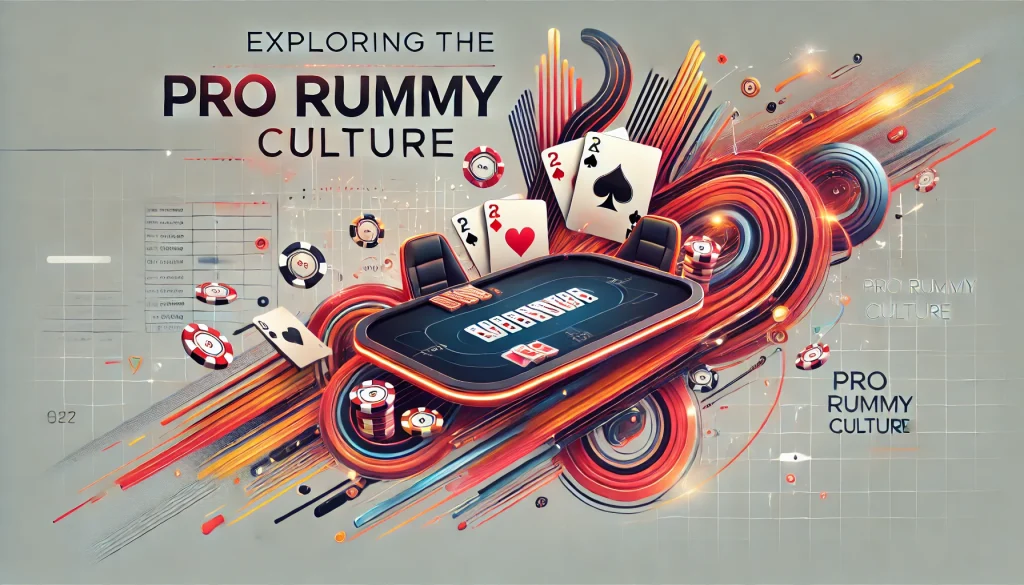
The Complete History of Rummy: From Inception to Competitive Sport The card game rummy, which has enthralled players for centuries, has a lengthy history that dates back to the early 1800s. Although its exact origins are unknown, some theories contend that it may have developed from earlier games like the Spanish game “Conquian” or the Chinese game “Dominoes.”. A game that resembled modern rummy was first mentioned in writing in the United States in the 1900s, and it was played using a regular deck of cards. The game experienced multiple adaptations as it traveled across continents, giving rise to different variations such as Gin Rummy, Indian Rummy, and Kalooki.
Every variation brought with it a unique set of guidelines & tactics that reflected the subtle cultural differences of the areas in which they were played. With its increasing popularity, rummy became a common game at family game nights and social events. Particularly in America, where it was frequently performed in clubs and parlors, its popularity skyrocketed in the middle of the 20th century. Its reach was further expanded with the advent of television and the internet, which enabled players to interact with people worldwide. Rummy had evolved from a recreational activity to a more structured game by the late 20th century, with competitions and tournaments starting to take shape.
This development was a turning point in rummy’s history because it made it more widely accepted as a serious competitive sport as well as a pastime. The creation of official rules and the holding of tournaments are two of the reasons why rummy evolved into a competitive sport. Rummy found a new home on the internet in the early 2000s as online gaming platforms started to proliferate. This digital revolution broke down geographical boundaries and promoted a global community by enabling players from various backgrounds to compete against one another. Features like leaderboards, rankings, and cash prizes were added by online rummy platforms, encouraging players to improve their abilities & compete fiercely. Both casual gamers and those looking to establish themselves in the professional gaming industry were drawn to this new accessibility.
As rummy’s competitive scene expanded, so did its acceptance as a real sport. A number of organizations started holding national and international competitions with sponsorship opportunities and sizable cash prizes. In order to ensure fair play and foster professionalism in the community, governing bodies were established to help standardize rules and regulations.
Rummy became more well-known & respected as a competitive sport as a result of televised events that featured elite players and their tactics. Rummy’s reputation as a competitive sport has been further cemented by the influx of new players eager to try their skills at higher levels as a result of its increased popularity. The pro rummy community is a colorful tapestry made up of many strands of skill, culture, and friendship.
Players from different backgrounds are brought together by their shared love of the game. Shared experiences, whether via local meetups, social media groups, or online forums, are what make this community thrive. Because they love rummy so much, many players make lifelong friends & frequently travel together to play in tournaments or just to have fun. There is a strong sense of camaraderie in this community; players frequently encourage one another by exchanging tactics, talking about recent matches, & acknowledging each other’s accomplishments. Also, pro rummy culture is defined by a fusion of sportsmanship and competition.
There is an underlying respect for each other’s abilities and commitment to the game, even though players compete fiercely during tournaments. An atmosphere where players can grow and learn from one another is created by this mutual admiration. In addition, a lot of professional rummy players take on mentoring roles, helping novices understand the nuances of the game and how to compete. In addition to fortifying ties, this caring element of the community makes sure that rummy’s legacy endures for upcoming generations.
Fundamentally, rummy is a skill-based game in which players must use a variety of tactics to outsmart their contestants. Effective pro rummy players are well-versed in probability and card distribution, which enables them to make wise choices at every stage of the game. Keeping a close eye on opponents’ moves is a basic tactic. By monitoring which cards are picked or discarded, players can learn a lot about their opponents’ hands & modify their strategy accordingly. This degree of observation necessitates a keen eye for detail and the capacity for multi-step planning, which are characteristics of proficient rummy players. Effective hand management is essential in pro rummy, in addition to observational abilities.
Gamers have to anticipate their opponents’ needs while balancing the composition of their own hands. Making strategic concessions, such as discarding cards that could help an opponent while keeping those that improve one’s own hand, is frequently required for this. Also, skilled players frequently use bluffing strategies to deceive their opponents about their actual motivations. They can take control of the game’s flow by casting doubt on the composition of their hands.
It takes both practice and an innate capacity for situational reading and quick adaptation to master these tactics. Pro rummy tournaments are thrilling occasions that highlight the finest players in the game and create an exciting environment for both participants and onlookers. Local contests hosted in community centers or large international gatherings with sizeable cash prizes are examples of these tournaments.
Many different tournament formats are used; some may use a round-robin system, while others may use a knockout format. Referees supervise gameplay and enforce regulations in every tournament, regardless of format, which is painstakingly planned to guarantee fairness and transparency. Beyond just gameplay, pro rummy tournaments are exciting because they frequently act as social events where players can bond & share their love of the game. Side events like workshops or panel discussions led by seasoned players who provide insights into cutting-edge tactics & techniques are common at tournaments. These educational opportunities improve the general quality of play while fostering a sense of community among participants. Tournament organizers are constantly coming up with new ways to improve player experiences and draw in bigger crowds as more players join the competitive scene.
Legends whose prowess has permanently altered the game are scattered throughout the pro rummy world. John Doe, who is renowned for his extraordinary strategic ability and composed manner at the table, is one such individual. With several championship titles under his belt, Doe is well-known in the rummy world. His distinct strategy outmaneuvers even the most experienced players by fusing painstaking preparation with a keen awareness of his opponents’ psychology. In addition to his achievements, Doe is highly regarded for his role in coaching aspiring players and imparting his knowledge via online tutorials and workshops.
Jane Smith, another well-known pro rummy player, has enthralled audiences all over the world with her dynamic style. Smith’s breakthrough performances in international tournaments, where she routinely outperformed her rivals with creative strategies that defied conventional gaming conventions, were a defining feature of her ascent to fame. She has received a lot of praise and respect from her peers for her ability to modify her approach at any time. Smith’s impact goes beyond her play; she actively promotes equality for all players and diversity among pro rummy players, advocating for inclusivity within the community. Apart from the official guidelines that regulate gameplay, pro rummy is rooted in etiquette that demonstrates regard for other players & the game’s integrity.
Sportsmanship is a key component of this etiquette; players are supposed to act politely whether they win or lose. Congratulating opponents on their accomplishments & abstaining from offensive remarks or gestures while playing are two examples of this. A positive environment is created by such behavior, which improves the experience for all parties. Following appropriate table etiquette in both casual and tournament settings is another significant tradition in pro rummy culture. It is advised that players maintain their playing space neat and orderly while being careful not to disturb other players at the table with loud noises or other distractions.
Also, communication is essential; players should politely converse with one another while explaining tactics or asking questions regarding the rules without compromising anyone’s self-esteem or skills. Pro rummy players foster a culture that values friendship and competition by adhering to these unspoken rules of etiquette. A number of trends suggest that pro rummy, the popular card game, will continue to thrive as a competitive sport in the future. Technological development is a major driver of growth; online platforms are always changing to improve user experiences with new gameplay mechanics, interactive features, and better graphics. These changes not only draw in new players but also present experienced rivals with novel obstacles to keep them motivated to improve.
Also, as mental sports—such as chess and poker—become more well-known worldwide, rummy is set to become acknowledged as an intellectual activity worthy of respect in competitive circles. As more groups that support professional recognition and sponsorship opportunities for elite athletes continue to grow, we can anticipate more talent joining this field in the future. Future generations will surely be inspired by pro rummy as it continues its journey toward widespread acceptance as a respectable sport, continuing its legacy while influencing its development in fascinating new ways. In summary, the rise of rummy from its modest beginnings to its current status as a recognized competitive sport is evidence of its timeless appeal and versatility. Pro rummy’s active community encourages players to bond while advancing their skills through opportunities for mentorship & shared experiences.
As technology develops and pro rummy gains popularity in competitive gaming communities, it is obvious that the game will continue to captivate players for many years to come.





